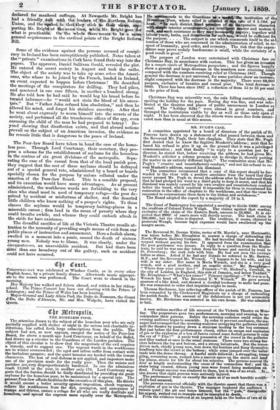The Poor-law Board have taken in hand the case of
the home- less poor. Through Lord Courtenay, their secretary, they pro- pose a scheme for the establishment of asylums for the houseless in the centres of six great divisions of the metropolis. Sepa- rating the ease of the casual from that of the local parish poor, they suggest that the cost of these asylums should be defrayed out of a special general rate, administered by a board or boards specially chosen for the purpose by unions collated under the sanction of the Poor-law Board. This is a sensible proposal, and its execution would have many advantages. As at present administered, the workhouse wards are forbidding to the very class who stand most in need of temporary refuge—the poor de- prived by accident or misfortune of shelter, and the deserted little children who know nothing of a pauper's rights. To these classes the asylums would be temporary halting-places in a miserable career ; firm land in the ocean of poverty where they could breathe awhile, and whence they could embark afresh in the strife for bare existence.
The dreadful sacrifice of life at the Victoria Theatre recalls at- tention to the necessity of providing ample means of exit from our public places of instruction and amusement. Here a foolish alarm, swelled in a moment into a panic, caused the death of sixteen young men. Nobody was to blame. It was clearly, under the circumstances, an unavoidable accident. But had there been wore than one broadway out of the gallery, such an accident could not have occurred.






































 Previous page
Previous page